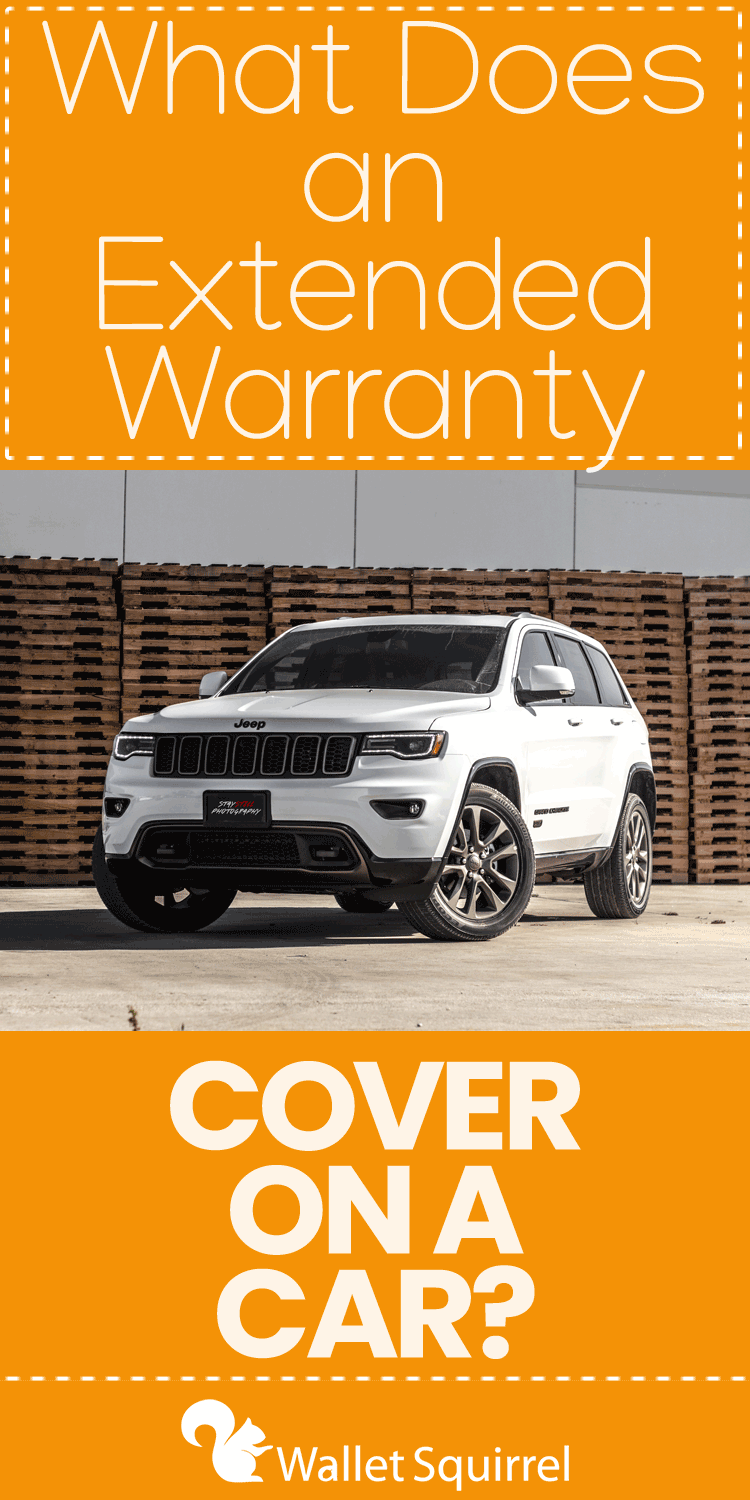What Does an Extended Warranty Cover on a Car?

That’s a particular key question when it comes to your car, something you likely use every day, or close to it. Is it a good idea to get the prolonged protection of an extended warranty? Will it cover everything that your original car warranty covered? Maybe, maybe not.
Here’s information to help you decide what makes the most sense for you.
What Is an Extended Warranty?
Typically, when you buy a new car, you get a manufacturer’s warranty, which covers you for certain repairs. But that warranty doesn’t last indefinitely, and you might still want protection once it has expired.
An extended warranty is essentially an insurance policy on your vehicle, protecting you against expensive unforeseen repairs. It typically kicks in after your manufacturer’s warranty expires to cover repairs for a specified period of time or number of miles, whichever comes first.
Extended auto warranties are also called vehicle service contracts or aftermarket warranties. They cost extra and are sold separately from the car. And they are technically not warranties, so they are not subject to the same federal consumer protections.
How Does a Car Warranty Work?
When you buy a car, it typically comes with a warranty. This is best described as an agreement with the car’s manufacturer that it will cover the cost of certain repairs or issues that may crop up —particularly issues that result from vehicle defects or poor workmanship. While car warranties vary, you can generally expect that things like problems with the engine, transmission, and steering system, for example, will be covered.
Types of Extended Warranties
There are two primary types of extended warranties. There are those that you get from the carmaker (or, in-car jargon, the original equipment manufacturer). And then there are those offered by third-party vendors, like an insurance or warranty company that is independent of the car manufacturer.
Car Manufacturer Extended Warranty
When you buy a new car, it generally comes with the manufacturer’s warranty. But also, when you are buying your car and/or when your original warranty ends, you might be offered an extended warranty by the manufacturer, too. If you choose to purchase this coverage, you will be charged for it. And while some manufacturers may replicate the terms of your original warranty, others may not, so you’ll want to check the terms very closely if you move forward with one of these policies. You’ll also want to check when the extended warranty begins, because there’s no point in paying for duplicative coverage.
Third-Party Warranties
Similarly, there are also auto service contracts that may be offered by dealerships or by third parties. Costs and what’s covered can vary widely, so if this is something that interests you, be sure to spend time comparing prices, coverage limits, deductibles, and terms before making a decision. It’s also a good idea to check the payment process for repairs. You might have to pay upfront and then file a claim for reimbursement.
Some third-party warranties may have exclusions, rules, and requirements that manufacturers’ warranties typically don’t. These downsides can include strict limitations on where you can have your vehicle fixed and hefty deductibles. There may be no guarantee that parts from the original manufacturer will be used.
What is Usually Covered Under an Extended Warranty on a Car?
Make no assumptions. Warranties differ, so if you opt for an extended warranty, be sure you know what’s covered and what’s not.
You might be able to get comprehensive bumper-to-bumper coverage. You may be able to find coverage for air conditioning and heating systems, electrical components, airbags, engines, transmission, and more. Or you might sign up for more targeted protection for the powertrain only or for other specific components.
Plans can also vary in duration, with most providing three to five years of coverage.
Your contract should also clearly spell out where and from what providers you can get assistance.
What’s Not Covered in a Car Warranty?
If you’re looking at extended warranties, this is a list you want to pay special attention to. It can be nerve-wracking as well as potentially quite costly when something you thought was covered is in fact not covered. Policies vary, but most often you won’t get coverage for routine maintenance like oil changes and tire rotations or the normal wear and tear on headlights, brakes, or holes in the seats or broken plastic, or scratches in the paint caused by your dog or children, among other things.
Are Tires Covered Under Warranties?
It’s a rarity for tires to be included in the manufacturer’s warranty.
Most often, the tire manufacturer provides the warranty on their tires and the typical duration is about four to six years. That coverage can include free repair if the tires develop problems during that window and/or replacement of tires if the original tires have manufacturing defects. Know however that if you need to make a claim, you will likely be asked to show proof that you’ve been taking good care of your tires regularly.
How to Qualify for an Auto Warranty
The newest car on the block is likely to get more love when it comes to auto warranties. If your vehicle is newish (definitely less than 10 years old), it’s likely to qualify for the most favorable coverage. If your car is brand-new, it’s probably under its manufacturer’s warranty still and chances are that most extended warranty policies that run concurrently would involve duplicating coverage. That’s why it’s a good idea to make sure you know when exactly your extended warranty begins.
And the lower your mileage is, the better the odds that you’ll be eligible for a full coverage extended warranty. Some extended warranty companies cap mileage for eligibility at 100,000 miles. This isn’t surprising, since when you have a lot of miles on your car, repairs are likely not too far down the road. Low mileage also helps lower the price of your coverage.
Cost of an Extended Warranty
How much is this extended protection going to cost you? Naturally, that depends. Factors include the age of your vehicle, how often you drive, the number of miles on your car, your car’s brand and model, condition of the car, coverage type, and your deductible (if you have one your premium will be lower), among others. For a ballpark figure, the average cost of an extended car warranty is about $2,800.
Pros and Cons of Extended Car Warranties
This chart sums up some of the top pros and cons when you’re deciding about getting an extended car warranty.
| Cons | Pros |
|---|---|
| You may not end up using the warranty, even though you’ve paid for it or the cost of repairs may be less than you paid for the warranty. | You have help covering the cost of repairs that are included in the plan. |
| These warranties may involve multiple exclusions, restrictions on where you can access service, and deductibles. | It may give you peace of mind to know that you have a plan to help deal with unexpected repair costs. |
| You may not have full protection even for parts that are covered. | If the warranty is transferable and you’re planning to sell your vehicle, it can increase the car’s value. |
Is an Extended Warranty Worth it?
If you’re buying a vehicle with a reliable track record, you may not need extra protection, especially at the price you’ll have to pay for it. The smarter play may be to “self-insure.” For this, you’d sock away some cash in an emergency account to take care of any repairs that might come up. Then, if you don’t need to use the funds for your car, you still have them available for other purposes.
But in the end, you know yourself best. If you’ll sleep better with an extended warranty, just in case, do what brings you peace. Just be sure to do your homework first so that you get what you need.
The Takeaway
There’s no way to know in advance whether an extended warranty could pay off or not. One alternative is to save the money you would have spent on one in a separate emergency account. If you do decide to buy an extended warranty, do your research and shop around to find the best product for you.
If you’re also thinking about refinancing your car loan, Lantern by SoFi can help. Fill out one simple form and receive auto refinancing offers from multiple lenders in our network.
The tips provided on this website are of a general nature and do not take into account your specific objectives, financial situation, and needs. You should always consider their appropriateness given your own circumstances.SOLC0621106

Wallet Squirrel is a personal finance blog by best friends Andrew & Adam on how money works, building side-hustles, and the benefits of cleverly investing the profits. Featured on MSN Money, AOL Finance, and more!










Leave a Reply
Want to join the discussion?Feel free to contribute!